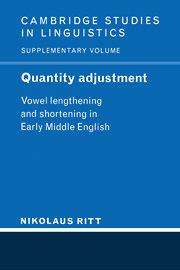Book contents
- Frontmatter
- Contents
- Preface
- 1 Approaching the changes
- 2 Reconstructing OSL
- 3 Widening the meaning of OSL
- 4 A suprasegmental view of OSL
- 5 Summary: OSL refined
- 6 Homorganic Lengthening
- 7 Shortenings
- 8 Epilogue: explaining Middle English Quantity Adjustment
- Appendix I OSL
- Appendix II HOL
- Appendix III SHOCC
- Appendix IV TRISH
- Notes
- References and further reading
- Index
3 - Widening the meaning of OSL
Published online by Cambridge University Press: 23 November 2009
- Frontmatter
- Contents
- Preface
- 1 Approaching the changes
- 2 Reconstructing OSL
- 3 Widening the meaning of OSL
- 4 A suprasegmental view of OSL
- 5 Summary: OSL refined
- 6 Homorganic Lengthening
- 7 Shortenings
- 8 Epilogue: explaining Middle English Quantity Adjustment
- Appendix I OSL
- Appendix II HOL
- Appendix III SHOCC
- Appendix IV TRISH
- Notes
- References and further reading
- Index
Summary
As I have already stated, Modern English data show that OSL did not affect the vowels of all its potential targets equally. Rather, some type of OSL targets were more likely to be changed by the process than others. This is, basically, what statements such as Low vowels seem to have been more likely to be lengthened than non-low vowels express.
What I would like to highlight here, then, is that these statements have so far been taken to be relevant exclusively with regard to potential OSL candidates. The corpus from which they were derived contained no other items. On second thoughts, however, hardly anything seems to speak against widening their potential applicability and interpreting them as general tendencies behind Early Middle English vowel lengthenings. This point is crucial and I would like to elaborate the argumentation on which it rests, although it might be viewed as rather pedestrian in essence.
Take, once more, the statement about vowel height and imagine, for a momentary excursion, that there were no other ‘sound changes’ apart from OSL, by which vowels were lengthened. This means that the probability of vowel lengthening would have been zero among all non-OSL candidates, no matter what the heights of their vowels were. Therefore, if OSL candidates and other words were combined into a single set, the relation between lengthened low vowels and lengthened high vowels would basically remain the same, although the difference will be relatively smaller.
- Type
- Chapter
- Information
- Quantity AdjustmentVowel Lengthening and Shortening in Early Middle English, pp. 43 - 46Publisher: Cambridge University PressPrint publication year: 1994



